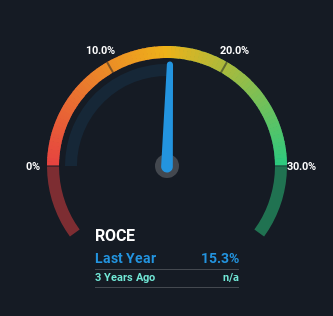- India
- /
- Hospitality
- /
- NSEI:KAMATHOTEL
Kamat Hotels (India) (NSE:KAMATHOTEL) Is Reinvesting At Lower Rates Of Return

Finding a business that has the potential to grow substantially is not easy, but it is possible if we look at a few key financial metrics. Typically, we'll want to notice a trend of growing return on capital employed (ROCE) and alongside that, an expanding base of capital employed. If you see this, it typically means it's a company with a great business model and plenty of profitable reinvestment opportunities. In light of that, when we looked at Kamat Hotels (India) (NSE:KAMATHOTEL) and its ROCE trend, we weren't exactly thrilled.
What Is Return On Capital Employed (ROCE)?
If you haven't worked with ROCE before, it measures the 'return' (pre-tax profit) a company generates from capital employed in its business. Analysts use this formula to calculate it for Kamat Hotels (India):
Return on Capital Employed = Earnings Before Interest and Tax (EBIT) ÷ (Total Assets - Current Liabilities)
0.15 = ₹731m ÷ (₹6.2b - ₹1.4b) (Based on the trailing twelve months to March 2024).
So, Kamat Hotels (India) has an ROCE of 15%. In absolute terms, that's a satisfactory return, but compared to the Hospitality industry average of 8.9% it's much better.
Check out our latest analysis for Kamat Hotels (India)

Historical performance is a great place to start when researching a stock so above you can see the gauge for Kamat Hotels (India)'s ROCE against it's prior returns. If you'd like to look at how Kamat Hotels (India) has performed in the past in other metrics, you can view this free graph of Kamat Hotels (India)'s past earnings, revenue and cash flow.
So How Is Kamat Hotels (India)'s ROCE Trending?
In terms of Kamat Hotels (India)'s historical ROCE movements, the trend isn't fantastic. To be more specific, ROCE has fallen from 37% over the last five years. Meanwhile, the business is utilizing more capital but this hasn't moved the needle much in terms of sales in the past 12 months, so this could reflect longer term investments. It's worth keeping an eye on the company's earnings from here on to see if these investments do end up contributing to the bottom line.
On a related note, Kamat Hotels (India) has decreased its current liabilities to 23% of total assets. That could partly explain why the ROCE has dropped. What's more, this can reduce some aspects of risk to the business because now the company's suppliers or short-term creditors are funding less of its operations. Some would claim this reduces the business' efficiency at generating ROCE since it is now funding more of the operations with its own money.
The Key Takeaway
Bringing it all together, while we're somewhat encouraged by Kamat Hotels (India)'s reinvestment in its own business, we're aware that returns are shrinking. Yet to long term shareholders the stock has gifted them an incredible 497% return in the last five years, so the market appears to be rosy about its future. Ultimately, if the underlying trends persist, we wouldn't hold our breath on it being a multi-bagger going forward.
On a final note, we found 5 warning signs for Kamat Hotels (India) (1 shouldn't be ignored) you should be aware of.
While Kamat Hotels (India) isn't earning the highest return, check out this free list of companies that are earning high returns on equity with solid balance sheets.
Valuation is complex, but we're here to simplify it.
Discover if Kamat Hotels (India) might be undervalued or overvalued with our detailed analysis, featuring fair value estimates, potential risks, dividends, insider trades, and its financial condition.
Access Free AnalysisHave feedback on this article? Concerned about the content? Get in touch with us directly. Alternatively, email editorial-team (at) simplywallst.com.
This article by Simply Wall St is general in nature. We provide commentary based on historical data and analyst forecasts only using an unbiased methodology and our articles are not intended to be financial advice. It does not constitute a recommendation to buy or sell any stock, and does not take account of your objectives, or your financial situation. We aim to bring you long-term focused analysis driven by fundamental data. Note that our analysis may not factor in the latest price-sensitive company announcements or qualitative material. Simply Wall St has no position in any stocks mentioned.
Have feedback on this article? Concerned about the content? Get in touch with us directly. Alternatively, email editorial-team@simplywallst.com
About NSEI:KAMATHOTEL
Good value slight.
Similar Companies
Market Insights
Community Narratives



